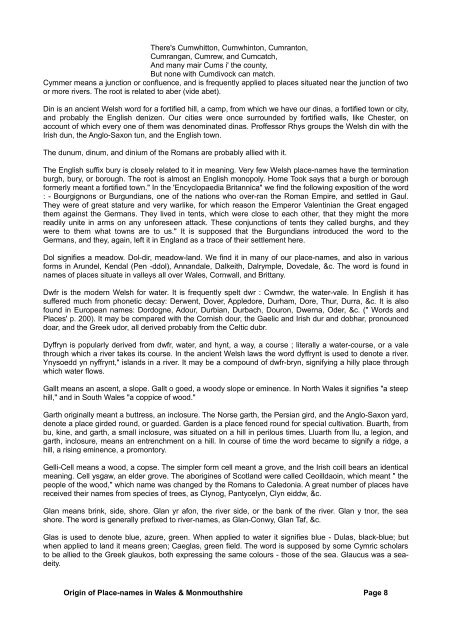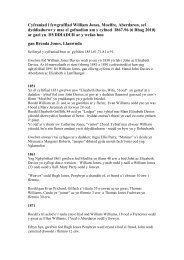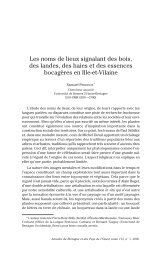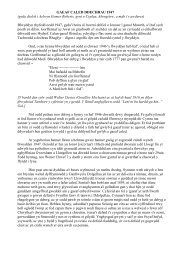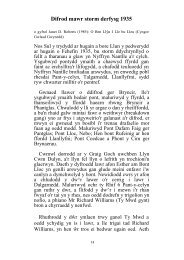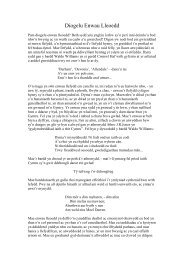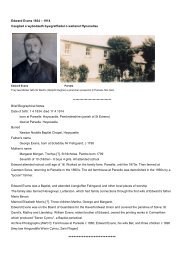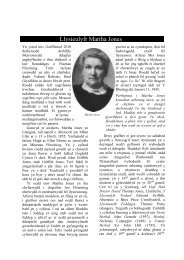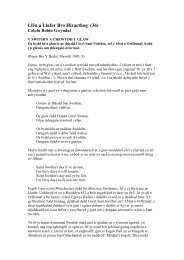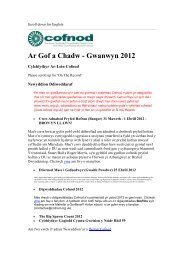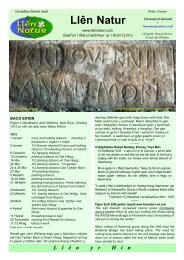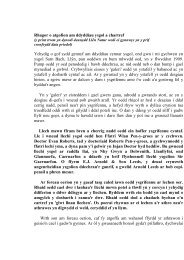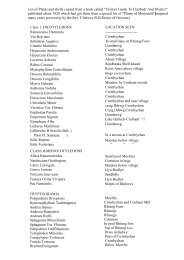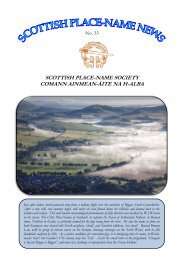<strong>the</strong> English had <strong>in</strong> govern<strong>in</strong>g <strong>the</strong> Welsh <strong>in</strong> former times. They had to plant <strong>the</strong>ir strongholds all along <strong>the</strong>Welsh border."Cefn, <strong>in</strong> <strong>names</strong> <strong>of</strong> <strong>place</strong>s, means a high ridge. It is but natural that this prefix should be applied to so many<strong>place</strong>s <strong>in</strong> mounta<strong>in</strong>ous Wales. The Chev<strong>in</strong> Hills <strong>in</strong> Yorkshire, <strong>and</strong> Cevennes <strong>in</strong> France, derive <strong>the</strong>ir <strong>names</strong>from <strong>the</strong> same root.Cil implies a sequestered <strong>place</strong>, a <strong>place</strong> <strong>of</strong> retreat. Cil haul means <strong>the</strong> shade or where <strong>the</strong> sun does notsh<strong>in</strong>e. Cil y llygad, <strong>the</strong> corner <strong>of</strong> <strong>the</strong> eye. In Irel<strong>and</strong> it is spelt kil (<strong>the</strong> c be<strong>in</strong>g changed to k) signify<strong>in</strong>g achurch, <strong>and</strong> is found <strong>in</strong> no less than 1,400 <strong>names</strong>, <strong>and</strong> <strong>in</strong> a good many <strong>in</strong> Scotl<strong>and</strong>. Kilkenny, church <strong>of</strong>Kenny; Kilpatrick, church <strong>of</strong> Patrick ; Kilmore (Cilmaivr), <strong>the</strong> great church. Gilmor is still a surname <strong>in</strong> <strong>the</strong>Scottish lowl<strong>and</strong>s, <strong>and</strong> we f<strong>in</strong>d Gilmorton <strong>in</strong> Leicester. We f<strong>in</strong>d <strong>the</strong> root <strong>in</strong> cilio, to retreat, to go away. Cilfach,a <strong>place</strong> to retreat to, a creak, a nook. Some Welsh historians th<strong>in</strong>k that cil is a local memorial <strong>of</strong> those Irishmissionaries, who, about <strong>the</strong> 5th century, visited <strong>the</strong> shores <strong>of</strong> Wales for evangelistic purposes, <strong>and</strong> foundedchurches <strong>in</strong> <strong>the</strong> most quiet <strong>and</strong> sequestered spots <strong>the</strong>y could f<strong>in</strong>d.Clyd means shelter<strong>in</strong>g, warm, comfortable. Lie clyd y a warm, comfortable <strong>place</strong>. We have it <strong>in</strong> differentforms <strong>in</strong> Clydach, Clydlyn, Clyder, Clyde, Strathclud, Clodock.Clyn signifies a <strong>place</strong> covered with brakes, Clyn o eith<strong>in</strong>, a furze brake.Cnwe literally means a bump, a swell<strong>in</strong>g : Cnwe y gwegil, <strong>the</strong> back part <strong>of</strong> <strong>the</strong> skull; but its geographicalsignification is a knoll or mound. We f<strong>in</strong>d it corrupted <strong>in</strong> a few Welsh <strong>names</strong>, Knucklas (Cnwe-glas), &c, <strong>and</strong><strong>in</strong> Irish <strong>names</strong>, Knockglass (Cnwe-glas), Knockmoy (Cnwe-tnai), Knockaderry (Cnwe-y-deri), &c , <strong>and</strong> <strong>in</strong>Engl<strong>and</strong> we have Nocton, Nacton, Knock<strong>in</strong>, Knook,&c.Coed is <strong>the</strong> Welsh for wood, trees. In remote times <strong>the</strong> summits <strong>of</strong> Cambria's hills were covered with wood,which accounts for <strong>the</strong> word coed be<strong>in</strong>g still applied to barren <strong>and</strong> hilly districts.Craig, a high rock or crag, <strong>and</strong> sometimes it is applied to a steep, woody em<strong>in</strong>ence. It takes <strong>the</strong> form <strong>of</strong>carraig or carrick <strong>in</strong> Irel<strong>and</strong> ; Carrigafoyle (Craigy- foel), <strong>the</strong> barren rock ; Carrickfergus, <strong>the</strong> rock whereFergus was drowned ; <strong>and</strong> <strong>in</strong> Engl<strong>and</strong> we f<strong>in</strong>d it <strong>in</strong> Crick, Cricklade, &c.Croes means a cross. Croes-ffordd, a cross- way. The word evidently po<strong>in</strong>ts to <strong>the</strong> Roman epoch, <strong>and</strong> alsoto <strong>the</strong> ancient Welsh custom <strong>of</strong> bury<strong>in</strong>g malefactors near <strong>the</strong> cross roads. Croes-fe<strong>in</strong>i, stone-crosses, <strong>in</strong> <strong>the</strong>time <strong>of</strong> Howell <strong>the</strong> Good, were used pr<strong>in</strong>cipally to mark l<strong>and</strong> property, <strong>and</strong> sometimes, when <strong>place</strong>d <strong>in</strong>hedges, to caution travellers not to cross <strong>the</strong> fields. Some <strong>of</strong> <strong>the</strong>m, with <strong>the</strong> <strong>names</strong> <strong>of</strong> <strong>the</strong> primitive Britishsa<strong>in</strong>ts <strong>in</strong>scribed upon <strong>the</strong>m, were <strong>place</strong>d by <strong>the</strong> road-side <strong>in</strong> commemoration <strong>of</strong> <strong>the</strong> blessed fact that <strong>the</strong>Gospel had been preached <strong>the</strong>re.Crug means a heap, a mound. Crug o gerryg, a heap <strong>of</strong> stones. It appears that <strong>the</strong> Britons held <strong>the</strong>ir bardic<strong>and</strong> judicial gorseddau or assemblies on <strong>the</strong>se mounds, <strong>and</strong> hence " crug" <strong>and</strong> " gorsedd," accord<strong>in</strong>g to Dr.Owen Pughe, are sometimes used as synonymous terms. " Crug " is a frequent component <strong>in</strong> Welsh <strong>names</strong>,<strong>and</strong> we f<strong>in</strong>d it Anglicized <strong>in</strong> Crich (Derby), Creach (Somerset), &c.Cwm denotes a low <strong>place</strong> enclosed with hills. It has a large <strong>place</strong> <strong>in</strong> Welsh nomenclature, <strong>and</strong> it <strong>of</strong>ten occurs<strong>in</strong> English local <strong>names</strong>, especially <strong>in</strong> <strong>the</strong> western counties. In Devonshire <strong>the</strong> Saxonized form comb or combemeet us frequently: Wide-comb, Wrel-comb, Ilfra-combe, Babba-comb, Burles-comb, Challa-comb, Haccomb,Para-comb, Yarns-comb, &c. In Somerset it is more plentiful than <strong>in</strong> any o<strong>the</strong>r English county: wehave Nettle-comb, Od-comb, Timber-comb, Charls-comb, Wid-comb, Moncton-comb, Comb-hay, Croscomb,W<strong>in</strong>s-combe,&c. We f<strong>in</strong>d K<strong>in</strong>g-combe, Rat-combe, Bos-comb, &c, <strong>in</strong> Dorset. Cumberl<strong>and</strong>, a Celticcounty, is derived by some from <strong>the</strong> combes with which it abounds. So writes Anderson, a Cumberl<strong>and</strong> poet,<strong>of</strong> his native county: -Orig<strong>in</strong> <strong>of</strong> Place-<strong>names</strong> <strong>in</strong> Wales & Monmouthshire Page 7
There's Cumwhitton, Cumwh<strong>in</strong>ton, Cumranton,Cumrangan, Cumrew, <strong>and</strong> Cumcatch,And many mair Cums i' <strong>the</strong> county,But none with Cumdivock can match.Cymmer means a junction or confluence, <strong>and</strong> is frequently applied to <strong>place</strong>s situated near <strong>the</strong> junction <strong>of</strong> twoor more rivers. The root is related to aber (vide abet).D<strong>in</strong> is an ancient Welsh word for a fortified hill, a camp, from which we have our d<strong>in</strong>as, a fortified town or city,<strong>and</strong> probably <strong>the</strong> English denizen. Our cities were once surrounded by fortified walls, like Chester, onaccount <strong>of</strong> which every one <strong>of</strong> <strong>the</strong>m was denom<strong>in</strong>ated d<strong>in</strong>as. Pr<strong>of</strong>fessor Rhys groups <strong>the</strong> Welsh d<strong>in</strong> with <strong>the</strong>Irish dun, <strong>the</strong> Anglo-Saxon tun, <strong>and</strong> <strong>the</strong> English town.The dunum, d<strong>in</strong>um, <strong>and</strong> d<strong>in</strong>ium <strong>of</strong> <strong>the</strong> Romans are probably allied with it.The English suffix bury is closely related to it <strong>in</strong> mean<strong>in</strong>g. Very few Welsh <strong>place</strong>-<strong>names</strong> have <strong>the</strong> term<strong>in</strong>ationburgh, bury, or borough. The root is almost an English monopoly. Home Took says that a burgh or boroughformerly meant a fortified town." In <strong>the</strong> 'Encyclopaedia Britannica" we f<strong>in</strong>d <strong>the</strong> follow<strong>in</strong>g exposition <strong>of</strong> <strong>the</strong> word: - Bourgignons or Burgundians, one <strong>of</strong> <strong>the</strong> nations who over-ran <strong>the</strong> Roman Empire, <strong>and</strong> settled <strong>in</strong> Gaul.They were <strong>of</strong> great stature <strong>and</strong> very warlike, for which reason <strong>the</strong> Emperor Valent<strong>in</strong>ian <strong>the</strong> Great engaged<strong>the</strong>m aga<strong>in</strong>st <strong>the</strong> Germans. They lived <strong>in</strong> tents, which were close to each o<strong>the</strong>r, that <strong>the</strong>y might <strong>the</strong> morereadily unite <strong>in</strong> arms on any unforeseen attack. These conjunctions <strong>of</strong> tents <strong>the</strong>y called burghs, <strong>and</strong> <strong>the</strong>ywere to <strong>the</strong>m what towns are to us." It is supposed that <strong>the</strong> Burgundians <strong>in</strong>troduced <strong>the</strong> word to <strong>the</strong>Germans, <strong>and</strong> <strong>the</strong>y, aga<strong>in</strong>, left it <strong>in</strong> Engl<strong>and</strong> as a trace <strong>of</strong> <strong>the</strong>ir settlement here.Dol signifies a meadow. Dol-dir, meadow-l<strong>and</strong>. We f<strong>in</strong>d it <strong>in</strong> many <strong>of</strong> our <strong>place</strong>-<strong>names</strong>, <strong>and</strong> also <strong>in</strong> variousforms <strong>in</strong> Arundel, Kendal (Pen -ddol), Ann<strong>and</strong>ale, Dalkeith, Dalrymple, Dovedale, &c. The word is found <strong>in</strong><strong>names</strong> <strong>of</strong> <strong>place</strong>s situate <strong>in</strong> valleys all over Wales, Cornwall, <strong>and</strong> Brittany.Dwfr is <strong>the</strong> modern Welsh for water. It is frequently spelt dwr : Cwmdwr, <strong>the</strong> water-vale. In English it hassuffered much from phonetic decay: Derwent, Dover, Appledore, Durham, Dore, Thur, Durra, &c. It is als<strong>of</strong>ound <strong>in</strong> European <strong>names</strong>: Dordogne, Adour, Durbian, Durbach, Douron, Dwerna, Oder, &c. (" Words <strong>and</strong>Places' p. 200). It may be compared with <strong>the</strong> Cornish dour, <strong>the</strong> Gaelic <strong>and</strong> Irish dur <strong>and</strong> dobhar, pronounceddoar, <strong>and</strong> <strong>the</strong> Greek udor, all derived probably from <strong>the</strong> Celtic dubr.Dyffryn is popularly derived from dwfr, water, <strong>and</strong> hynt, a way, a course ; literally a water-course, or a valethrough which a river takes its course. In <strong>the</strong> ancient Welsh laws <strong>the</strong> word dyffrynt is used to denote a river.Ynysoedd yn nyffrynt," isl<strong>and</strong>s <strong>in</strong> a river. It may be a compound <strong>of</strong> dwfr-bryn, signify<strong>in</strong>g a hilly <strong>place</strong> throughwhich water flows.Gallt means an ascent, a slope. Gallt o goed, a woody slope or em<strong>in</strong>ence. In North Wales it signifies "a steephill," <strong>and</strong> <strong>in</strong> South Wales "a coppice <strong>of</strong> wood."Garth <strong>orig<strong>in</strong></strong>ally meant a buttress, an <strong>in</strong>closure. The Norse garth, <strong>the</strong> Persian gird, <strong>and</strong> <strong>the</strong> Anglo-Saxon yard,denote a <strong>place</strong> girded round, or guarded. Garden is a <strong>place</strong> fenced round for special cultivation. Buarth, frombu, k<strong>in</strong>e, <strong>and</strong> garth, a small <strong>in</strong>closure, was situated on a hill <strong>in</strong> perilous times. Lluarth from llu, a legion, <strong>and</strong>garth, <strong>in</strong>closure, means an entrenchment on a hill. In course <strong>of</strong> time <strong>the</strong> word became to signify a ridge, ahill, a ris<strong>in</strong>g em<strong>in</strong>ence, a promontory.Gelli-Cell means a wood, a copse. The simpler form cell meant a grove, <strong>and</strong> <strong>the</strong> Irish coill bears an identicalmean<strong>in</strong>g. Cell ysgaw, an elder grove. The ab<strong>orig<strong>in</strong></strong>es <strong>of</strong> Scotl<strong>and</strong> were called Ceoilldao<strong>in</strong>, which meant " <strong>the</strong>people <strong>of</strong> <strong>the</strong> wood," which name was changed by <strong>the</strong> Romans to Caledonia. A great number <strong>of</strong> <strong>place</strong>s havereceived <strong>the</strong>ir <strong>names</strong> from species <strong>of</strong> trees, as Clynog, Pantycelyn, Clyn eiddw, &c.Glan means br<strong>in</strong>k, side, shore. Glan yr afon, <strong>the</strong> river side, or <strong>the</strong> bank <strong>of</strong> <strong>the</strong> river. Glan y tnor, <strong>the</strong> seashore. The word is generally prefixed to river-<strong>names</strong>, as Glan-Conwy, Glan Taf, &c.Glas is used to denote blue, azure, green. When applied to water it signifies blue - Dulas, black-blue; butwhen applied to l<strong>and</strong> it means green; Caeglas, green field. The word is supposed by some Cymric scholarsto be allied to <strong>the</strong> Greek glaukos, both express<strong>in</strong>g <strong>the</strong> same colours - those <strong>of</strong> <strong>the</strong> sea. Glaucus was a seadeity.Orig<strong>in</strong> <strong>of</strong> Place-<strong>names</strong> <strong>in</strong> Wales & Monmouthshire Page 8
- Page 1 and 2: HANDBOOK OF THE ORIGIN OF PLACE-NAM
- Page 3 and 4: § § § § §The Author begs to st
- Page 5 and 6: pitiful cries of the railway offici
- Page 7 and 8: Bishop Percy says that "in England,
- Page 9: The city of Chester is still popula
- Page 13 and 14: Llwyn in its primary' sense means a
- Page 15 and 16: PLACE-NAMES IN WALES.Wales. — The
- Page 17 and 18: Church are generally dedicated to e
- Page 19 and 20: think he was a contemporary of St.
- Page 21 and 22: Rhosbeirio. — Rhos, a moor, a dry
- Page 23 and 24: of Brecknock," states that this vic
- Page 25 and 26: Cam cnwir ef Cwmdu,Cwm gwyn yw & n
- Page 27 and 28: Penderyn. — A corruption probably
- Page 29 and 30: Ardudwy. — Ar, upon or above; tud
- Page 31 and 32: to mark its pre-eminence over the o
- Page 33 and 34: Some think that eirw is a corruptio
- Page 35 and 36: present form — Caerfyrddin.Abergw
- Page 37 and 38: place of refuge; hence the name. En
- Page 39 and 40: Llansawyl. — The church was dedic
- Page 41 and 42: eject. The village took its name fr
- Page 43 and 44: house, and attempted to kill an inf
- Page 45 and 46: Gwydir. — Prima facie one may tak
- Page 47 and 48: Nefyn. — The church was probably
- Page 49 and 50: DENBIGHSHIRE.Anglicized form of Din
- Page 51 and 52: Llangollen. — From Collen, a sain
- Page 53 and 54: hands into their pockets to pay a c
- Page 55 and 56: Cefn. — The name signifies a ridg
- Page 57 and 58: Maesgarmon. — Named in honour of
- Page 59 and 60: Abertridwr. — Tridwr, three water
- Page 61 and 62:
it is said, was originally built by
- Page 63 and 64:
Cwmllynfell. — Cwm, a narrow vale
- Page 65 and 66:
Gwarycaeau. — Gwdr, the nape of t
- Page 67 and 68:
means a cultivated region, a vale,
- Page 69 and 70:
Penrhiwfer.- Pen, head, top; rhiw,
- Page 71 and 72:
Port Talbot. — So called in 1835
- Page 73 and 74:
Trealaw. — This appellation was g
- Page 75 and 76:
Aberdyfi. — So called from its si
- Page 77 and 78:
Llanddwywe. — From Dwywau, a desc
- Page 79 and 80:
Crickhowell and some in the directi
- Page 81 and 82:
Griffithstown. — This village was
- Page 83 and 84:
and gwy, water. Treiddiod troth tna
- Page 85 and 86:
derive Tintern from din, fortified
- Page 87 and 88:
Caersws. — It appears that the Ro
- Page 89 and 90:
English name — Ervylton.Llanymech
- Page 91 and 92:
Angle. — Probably from the angle-
- Page 93 and 94:
Gellyswick. — Another hybrid. Gel
- Page 95 and 96:
that the two rivers in their flowin
- Page 97 and 98:
ecame the bishop of the see, and wa
- Page 99 and 100:
earth formerly stood on a summit on
- Page 101 and 102:
Pilleth. — A corruption of pwll,
- Page 103 and 104:
Howells, Rev. J., Mountain AshHowel
- Page 105 and 106:
Williams, D., PenywernWilliams, Rev


